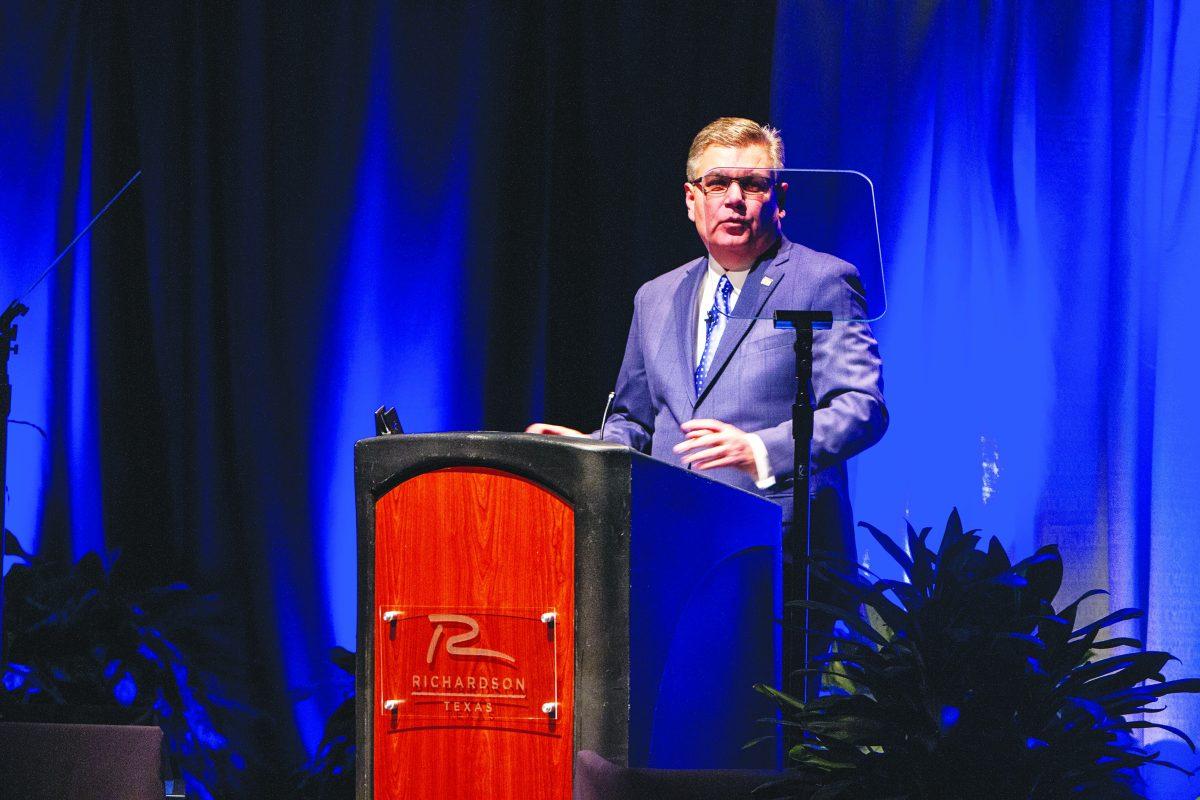
Richardson officials, community members and business leaders appeared at the annual State of the City video address, highlighting past and future city endeavors. Photo by Megan Zerez | Mercury Staff.
Editor’s Note: This story has been updated to correct J.J. Koch’s stance on Richardson’s proposed tax cap. He does not oppose the tax cap but opposes the mayor’s stance on it.
Richardson Mayor Paul Voelker
addressed local businesses, government and community members on Jan. 30 at the
annual State of the City Address. Voelker highlighted Richardson’s draws to the
business community and spoke out against capping municipal taxes ahead of the
new state legislative session.
UTD President Richard Benson appeared
in several video clips throughout Voelker’s multimedia address, with the mayor
calling UTD “a great success story for Richardson.”
The city will partner with UTD and
other schools to build the Collins-Arapaho Innovation District, Voelker said.
He said the project aims to attract additional tech companies to the region.
Preliminary studies for the district
were presented in a Dec. 3 City Council meeting. The redevelopment project
encompasses 1,200 acres around Arapaho Road east of Highway 75 and will be
centered around public transit and pedestrian accessibility.
Richardson already has a high
concentration of business headquarters, with 60 percent of property taxes
generated by businesses. According to the most recent municipal budget, 0.8
percent of total property taxes go back into economic development,
incentivizing projects such as the Restaurant Park development off of Highway
75.
“One of our keys to success
is working with local business leaders to strengthen our economy,” Voelker
said.
The narrated
video presentation highlighted efforts to keep interactions with the city
straightforward and simple for both businesses and citizens. Voelker praised
the city’s access to multimodal and public transit as a draw for businesses
looking to relocate.
According
to data aggregator Walkscore.com, transit and walkability scores for Richardson
remain at 32 and 43, respectively, out of 100 possible points. This means most
errands in the city require a car and there are few available public transport
options. Richardson currently hosts four DART stations, though a fifth has been
proposed at Northside as part of the planned Cotton Belt Line.
Three of
the four extant stations include large surface parking areas and operate as
“Park and Ride” stations, reflective of the city’s emphasis on multimodal
transit rather than strictly public transit.
Voelker
ended the presentation by addressing public education funding and property tax
rates.
“We feel
state legislatures often point fingers at cities when the major cause of this
issue lies with the state budgeting process,” Voelker said. “While all arms of
government need to be mindful of spending (and) where the money comes from,
there’s a balance that needs to be found.”
Voelker
cited the current debate over funding for Texas public schools as an example.
“Public
education funding is the responsibility of the state, as outlined in the Texas
constitution,” Voelker said. “Today, Texas is spending less per student than it
has in the past, and less than other states.”
According
to a 2018 report from the National Education Association, Texas’s 2017
per-student expenditures were $2,481 below the national average. While the
national average for per-student expenditures increased by 1.58 percent from
2016 to 2017, Texas’s average decreased by nearly 2 percent. Voelker ended the
address by asking residents to vote against any municipal tax caps, citing
concerns over a “one-size-fits all solution.”
Among the many attendees of the address was the newly elected Dallas County Commissioner, J.J. Koch, who in an interview with The Mercury said he opposed Voelker’s stance on the tax cap.
“They
took a hard stance, and it’s understandable from where they’re coming from, but
I don’t agree,” Koch said. “I think you (should) give your citizens an
opportunity to vote on that tax rate, and if you’re a city like Richardson,
that does a good job of communicating, then it shouldn’t be a problem to get
that higher rate.”
Koch
ran on a hardline conservative platform in the last election. He said despite
his opposition to Voelker’s stance on taxes, he was impressed with the address.
“You
can tell residents are happy about the way things are going, and if (the city)
executes the way the presentation was put forward, they’ll be in good standing
for the next couple of years,” Koch said.